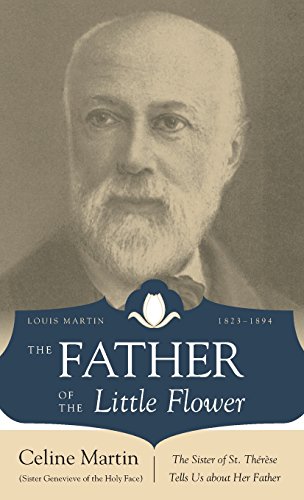The Father of the Little Flower
Louis Martin (1823-1894)
Celine Martin
BOOK REVIEW

In the whirlwind of life, where the chaos of modernity often overshadows the essence of family and faith, The Father of the Little Flower: Louis Martin (1823-1894) emerges as a beacon of hope and guidance. This poignant biography by Celine Martin takes us on a journey through the life of Louis Martin, a man whose simple yet profound existence laid the groundwork for a legacy that resonates even today. It is not merely a recounting of facts but a stirring exploration of a soul committed to faith, family, and unwavering love.
Louis Martin, the devoted father of the famed Saint Therese of Lisieux, navigated the trials and tribulations of parenthood with a grace that many can only aspire to. Celine Martin meticulously paints a portrait of a man who, despite facing devastating losses and societal pressures, embodies the profound tenets of patience, perseverance, and piety. At a time when the world was grappling with profound changes and the rapid pace of industrialization, Louis stood firm, anchored by his faith and an unbreakable bond with his children. His story is a heartfelt reminder that in a chaotic world, the quiet strength of a devoted father can reverberate through generations.
Readers have found themselves enveloped in the emotional tapestry woven throughout the pages. The book has sparked a wave of admiration and introspection, urging them to reflect on their own parental figures and the impact of familial love. Many praise Celine Martin's ability to humanize Louis, showing not just his virtues, but also his struggles. It's in these moments of vulnerability that we find relatability, as the author captures the essence of a man who was far from perfect yet profoundly impactful.
Yet, not all reactions are harmonious; some critiques argue that the narrative leans heavily on sentimentality, risking a portrayal that borders on the idealized. To some readers, the steadfast devotion and gentle spirit of Louis may come off as overly romanticized, failing to delve deeper into the complexities of his life and the societal challenges of 19th-century France. This debate enriches the reading experience, for every criticism serves as a prompt for deeper inquiry into Louis's character and the formidable realities surrounding him.
What stands out in The Father of the Little Flower is its ability to transcend time. Louis Martin's values of humility, generosity, and endless compassion are not just relics of history; they are principles that can, and should, influence our modern lives. The book challenges us to rethink our roles within our families and communities, urging us to foster the kind of bonds that stand resilient against the test of time. We are impelled to engage with the legacies we inherit and, moreover, those we will leave behind.
Celine Martin's voice echoes with the authority of someone who not only recounts history but also embraces it. As readers dive into the rich narrative, they are compelled to ask themselves questions that traverse beyond the pages: What can a 19th-century father teach us in the face of contemporary challenges? How can we, too, embody the spirit of Louis Martin in our daily interactions and familial commitments?
Furthermore, the impact of Louis Martin extends well beyond his immediate family, influencing countless others throughout history who have drawn inspiration from his life. He serves as a figure of resilience and faith for those seeking guidance amidst personal turmoil or societal upheaval. The legacies of strong family values and unwavering support have shaped the foundations of many movements, and Louis's life is embedded within that larger tapestry.
In an age where the essence of genuine connection often feels lost, The Father of the Little Flower not only uplifts but also ignites a longing to return to simpler, more meaningful relationships. Your heart cannot help but be stirred by the unwavering love of Louis for his children, as he builds a nurturing home environment that prioritizes love and spirituality above all.
This profound biography ultimately dares you to reflect on your life, pushing you to cultivate relationships that leave a lasting impact. In reading about Louis Martin's remarkable journey-a journey characterized by humility, perseverance, and radical love-you may find yourself inspired to reclaim the extraordinary within the ordinary of your own life. And as you close the final pages, a question lingers: What kind of legacy will you leave behind?
📖 The Father of the Little Flower: Louis Martin (1823-1894)
✍ by Celine Martin
🧾 152 pages
2005
#father #little #flower #louis #martin #1823 #1894 #celine #martin #CelineMartin